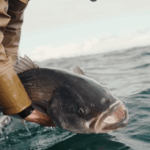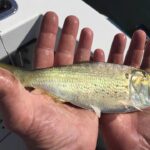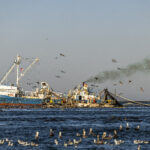
Release Mortality Revisited: New Research from Massachusetts DMF
Feature Photo Credit: Robbie Tartaglia What’s going on? For decades, striped bass management relied on a
Tony Friedrich ASGA VP/Policy Director
The American Saltwater Guides Association decided to comment on the possible adjustment to the Massachusetts commercial striped bass season. We try to take everything into consideration when we comment on any issue. ASGA is not against commercial fishing. Ultimately, a dead fish is a dead fish. Does it really matter who killed it?
When we commented on this specific issue, we were very careful to point out that it is just a bad idea to extend a season when everyone and their brother knows that striped bass are in serious trouble. We spoke for the resource, not against a specific sector.
Massachusetts responded in an extremely positive way. Commercial landings have increased, and the commonwealth decided not to increase the allowable days. They also did something pretty incredible. If the issue needs to be revisited in the fall, Massachusetts is going to self-impose an 18% reduction on the 2019 commercial season.
The commercial quota would be reduced from approximately 820k pounds to 713k pounds. That’s right folks, Massachusetts is lowering the limit for 2019 to reflect the changes they know are coming in 2020. We’ve been doing fisheries policy for a long time and we can count on one hand how many times any state has been this proactive.
We can’t thank Massachusetts enough for this forward-thinking approach to this issue. We already thanked them for their stewardship at the recent ASFMC meeting. It wouldn’t be a bad idea for our readers in Massachusetts to send another “thank you” for this development. You can’t ask for more in fisheries policy.
You may recall earlier this year, Virginia took a firm stance on striped bass conservation in the spring. Virginia cancelled the spring season completely with a unanimous vote at VMRC. Some said this did little for conservation because the spring season has been dismal lately. However, Virginia used to harvest over 20% of the striped bass coastwide. They are down to below 5% now. Conservation is conservation no matter how you slice it.
Virginia took it a step further recently. Virginia decided to take further action before the impending 2020 harvest reductions. The VMRC voted unanimously to enact emergency regulations for the fall/winter 2019 season.
” The emergency measures will establish a bag limit of one fish per angler per day, with a maximum size limit of 36 inches. The emergency measures also establish a maximum gill net size of 9 inches in the coastal fishery and 7 inches in the Chesapeake Bay fishery. These emergency measures will lower overall mortality of striped bass and protect the large breeding fish that are critical to the health and future of the population. The Commission will revisit these for final action at the September meeting, which will include an option for public comment.”
Secretary Strickler went on to comment, “Poor management of striped bass over the past decade has caused significant economic harm to Virginians who depend on healthy fisheries for their livelihoods and has reduced opportunities for recreational anglers. I applaud the strong leadership shown today by the Marine Resources Commission and Commissioner Bowman on striped bass conservation and their commitment to restoring this iconic fishery.” Said Secretary of Natural Resources Matthew J. Strickler, “We need other states to follow our example and help rebuild the striped bass population starting immediately. Delay is unacceptable and the Atlantic State Marine Fisheries Commission must take decisive action that will ensure restoration of this fishery up and down the coast.”
Then there was Commissioner Abbott from New Hampshire at the ASMFC meeting in August aiming for the cheap seats with a potential homerun for striped bass. He offered a change to the motion that could have all but ensure striped bass recovery.
Commissioner Abbott said, “I’m kind of a new guy at the table. I’ve only been here for 23 years. 22 years ago, I was drafted to sit on the striped bass board. There’s an old phrase, a fine kettle of fish. I think we find ourselves in that kettle right now. So, after a lot of thought and being who I am, I’ve decided to step into these dangerous waters. Striped bass are overfished and experiencing overfishing based on the most recent assessment. So, we are here today to meet the obligations of Amendment 6. Many anglers through the years have expressed to me and many others, a strong displeasure with varying regulations and this disparity is principally due to the generous application of conservation equivalency. I may be wrong, but I don’t know of any conservation equivalency application that isn’t really intended to increase the mortality of striped bass. In my many years in the legislature I always held the belief that when one is advantaged someone else is going to be disadvantaged. We are here in part because some of us have been advantaged and we are all here to pay the piper. I think the public should be given an opportunity to have their voice heard.”
Commissioner Abbott followed up with a motion to remove conservation equivalency (CE) as an option for amendment VI. While the motion failed, it was very encouraging to see this topic discussed as well as the recognition that some states are exploiting loopholes with CE.

This all seems like good news and things are going in the right direction.
Leave it to New Jersey to make us unceremoniously crash back to Earth like a rocket that ran out of fuel. NJ DEP announced the opening of the “bonus tag” program. It will start on September 1, 2019 and allows anglers in New Jersey to harvest a third striped bass.
New Jersey does not allow commercial netting of striped bass and that quota was transferred to the recreational sector (215,912lbs) in the form of these tags.
To be fair, the state requires that these tags are applied for and reported. Looking at the numbers, there were about 5,000 applications for bonus tags in 2018. There were only about 1,100 tag returns. Does that pass the smell test? Are that many anglers not able to catch a striper between 24-28”? Are they just not reporting? The rules dictate that the angler must attach the tag immediately and report the fish within 24 hours online or with a phone call. Based on the reporting, you have to wonder if those rules are being followed.
Proponents would argue that New Jersey is actually conserving fish. On paper, it looks like there are way less fish being harvested vs the old commercial quota. The reality is that a bonus tag can be an easily exploited due to lack of enforcement and the fact that New Jersey has incredible access. You don’t need a boat to target striped bass in New Jersey. So, there’s no bottleneck, like a public launch in Maryland, for officers to do comprehensive assessment of compliance.
We have to ask if this is prudent. Through conservation equivalency, New Jersey is already one of only two coastal states that can harvest two striped bass. With the bonus tag, that makes three fish legal. Do you really need to harvest three striped bass at this juncture?
As you can see from the positions of different states, there are really two schools of thought on striped bass. One side is saying they have to kill fish. The other side is saying that abundant populations and opportunity drive participation. This was crystal clear during a back and forth at the ASMFC meeting two weeks ago.
Adam Nowalsky, New Jersey commissioner, said, “I would also like to see some language change in 2.2.5 under socio economic impacts. Specifically, the first paragraph, the second paragraph talks about there’s expected negative short-term impacts, but the long-term impacts will be positive. I think, most of us around the table agree with that sense in theory, but the reality is, what we’ve experienced is as we continue to take these changes, there’s a loss in interest in the fishery, particularly on the recreational side. There is a loss of infrastructure that often occurs on the commercial side and there aren’t many cases in the last ten years in particular where we are getting back what we hoped to. Again, in theory I think we agree with it. But I would like to see something added to the sections that reflects that there is anticipated loss of interest and infrastructure that may not allow the long term expected benefit to be reaped as expected in this section.”

In other words, the economy will suffer in both the short term and the long term if harvest is reduced.
John McMurray responded, “I would request that we add language that there’s a much greater loss of interest when there are no fish around. Because, this fishery is driven opportunity to catch fish not how small of a fish you can catch. I’ve been at it a long time and that’s really the truth about the striped bass fishery. “
It comes down to this simple difference and has morphed into a Hatfield’s vs McCoy’s war. Do you want the opportunity to catch a lot of fish or do you want to keep harvesting even if it hurts the stock? Which side are you on? Is it about the harvest or the experience? Do you agree with the bonus tag system? Do you think states like Virginia and Massachusetts are doing the right thing for the fishery?
For us, abundance equals opportunity and opportunity drives participation. Participation drives effort and that’s what positively impacts all sectors.
We are getting down to crunch time folks. Stay tuned for our formal position on Addendum VI. It will be available towards the middle of next week.
Until then, here is the hearing schedule and the public documents to prep for the meetings.

Feature Photo Credit: Robbie Tartaglia What’s going on? For decades, striped bass management relied on a

Recent developments in the 2025 Atlantic Menhaden Stock Assessment Update, released by the Atlantic States

What’s going on? The “most important fish in the sea” just exposed one of the

Mario CampoFisheries Ecologist, Southeastern Louisiana UniversityScience and Policy Associate, American Saltwater Guides Association This discussion
We rely on our members and donations to keep fighting for a sustainable tomorrow in marine conservation.
GIVE THE GIFT OF FISHERIES CONSERVATION THIS HOLIDAY SEASON. SHOP ASGA GOODS THAT FUND FISHERIES RESEARCH & ADVOCACY CAMPAIGNS
JOIN ASGA IN CALLING FOR CRITICAL MANAGEMENT ACTION AFTER YEARS OF SPAWN FAILURES & POOR MANAGEMENT.
By using this website, you agree to our use of cookies. We use cookies to provide you with a great experience and to help our website run effectively. To learn more, please review our privacy policy.
One Response
I would remind you that the promised 18% reduction in the Massachusetts commercial harvesting quota will only be instituted if and when the number of commercial harvesting days are increased. The Commonwealth is not voluntarily reducing their commercial harvesting quota for 2019 unless and until they also grant more commercial harvesting days. If the number of commercial harvesting days stay the same then so does the ASMFC assigned 820k pound commercial harvest quota. This is a start but not the magnanimous conservation gesture that it superficially appears to be.